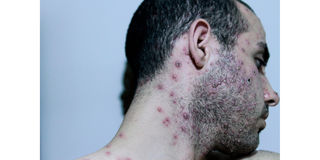Be vigilant, not scared, health experts say on monkeypox

Monkeypox a rare smallpox-related virus, causes flu-like symptoms and a nasty rash, and it can be deadly.
Health experts have warned Kenyans to stay vigilant amid reports that samples of suspected monkeypox cases in the country have been flown to Senegal for further investigations.
In its first advisory regarding the virus, the Lake Region Economic Bloc’s (Lreb) eminent committee has urged counties to be prepared with their medical teams by reporting suspected cases should anyone present with symptoms.
“Patients present themselves with flu-like symptoms, typical rashes, lesions located in genitals and perianal areas. Some patients present with proctitis (inflammation of the lining of the rectum) such that their illnesses could be clinically confused for sexually transmitted infections like syphilis, herpes, and varicella zoster virus infections,” Prof Khama Rogo, chair of the Lreb eminent committee, said in a statement.
Higher morbidity
“In addition, HIV clinics should be alerted because monkeypox causes a higher morbidity in people living with HIV since they can develop secondary bacterial infections of the lesions,” he added.
Dr Ahmed Kalebi, a clinical pathologist, played down fears of the virus in the country, saying monkeypox is not as contagious as coronavirus.
“We should not be scared as monkeypox is not as contagious as coronavirus and it can be easily contained through simple public health and personal measures. We also have a vaccine against it,” he said. Dr Kalebi said once a monkeypox virus case is confirmed, contact tracing of people who were with the patients is fairly easy. Patients can be monitored and a ring vaccine strategy be implemented to contain it from spreading.
He wondered why the samples had to be flown to Senegal yet the country has modern laboratories. He said the setting up of local testing centres will improve turnaround time and ensure contact tracing is faster.
Monkeypox virus
“The Ministry of Health needs to set up the polymerase chain reaction for monkeypox virus. All that is needed is the molecular probes [reagents] as the country has the specialised equipment and personnel to conduct the test,” said Dr Kalebi.
People can protect themselves from the virus by avoiding physical contact with affected persons. “The most important preventive measure is that anyone who has the lesions that could be monkeypox must isolate and seek medical attention,” said Dr Kalebi. He said there was need for sensitisation on the types of skin lesions that are likely to be from a monkeypox virus.
Prof Rogo urged Kenyans to avoid stigmatising people with symptoms that resemble that of monkeypox as it is not a death sentence. He also called on county governments to protect healthcare workers.
The World Health Organisation’s latest situation report that was released yesterday showed that the virus has now spread to 27 non-endemic countries.
“Most reported cases so far have been presented through sexual health or other health services in primary or secondary health care facilities and have involved mainly, but not exclusively, men who have sex with men,” it said.





